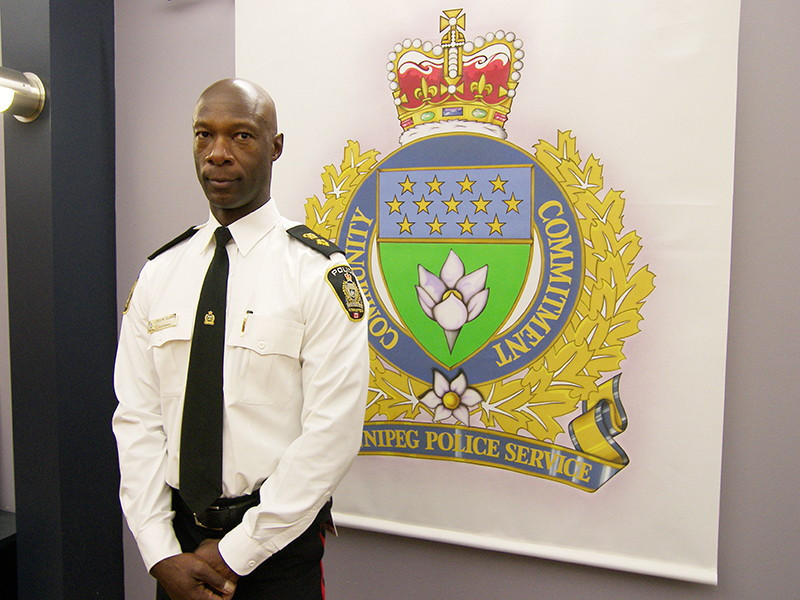Why Devon Clunis’s faith matters - and why it doesn’t
Winnipeg police chief’s call to prayer exposes short-sighted secularists
As a Canadian political observer, I’ve become fascinated by the bizarre relationship many Canadian secularists have with faith and public life.
Canadian nonbelievers largely respect people of faith. But when public officials have the audacity to acknowledge the importance of faith in Canada, or when they speak about their personal religious beliefs, secularists react with disdain or indifference.
I am convinced this is largely because secularists view public policy progress as synonymous with further church/state separation.
Unlike the United States, Canada lacks a constitutionally mandated separation of church and state and, as such, many identify as crusaders for that cause in Canada.
They practice this in various ways, from opposing public investment in the Youth for Christ Centre at the corner of Higgins Avenue and Main Street to attempting to prohibit prayer sessions at the legislative assembly.
And, from using the Charter of Rights and Freedoms to fight legislation that once kept businesses from operating on “the Sabbath” to protecting gay rights, they have done very important work.
Overall, I agree that democracy naturally connotes an understanding of the public good as separate from the dictates of a prophet or spiritual charlatan.
I am an atheist and a secularist. I believe that freedom of religion is also freedom from religion.
But many of my cohorts miss the mark by failing to recognize the intellectual and cultural weight of theology, and so they overreact when they confront faith in the public sphere.
Look no further than our most revered Canadian prime minister, Pierre Trudeau, whose Catholic faith was among his main ideological influences.
Trudeau’s supporters relish in statements like “the state has no business in the bedrooms of the nation,” but rarely speak of the unique brand of Catholicism - known as “personalism” - that inspired much of his belief in the importance of individual liberty.
The notion that Christianity could have profoundly influenced a secular document like the Charter is largely rejected by the over 20 per cent of Canadians who tick “none” in the religious affiliation section of their census form.
Similarly, they fail to recognize the connection between the social gospel as preached by traditional socialists like J.S. Woodsworth and the inclusive social democracy of the contemporary New Democratic Party of Canada, or the vast impact faith communities have had in founding Canadian universities and colleges: the incubators for an informed, democratic society.
Ultimately, many secularists seem to conceive of religion as quaint, superficial moral Viagra that only works to hold society back from progress. They fail to acknowledge that it has contributed to the formation of a just, secular democracy.
And it continues to do so, through charity and good will.
When Aaron Epp, The Uniter’s managing editor and a freelance writer with ChristianWeek, wrote an article in the latter publication about the Christian faith of Winnipeg’s new police chief, Devon Clunis, secular Winnipeggers largely reacted by mocking the chief, questioning his ability and criticizing his ethics.
Clunis, a Jamaican-Canadian and a 25-year veteran of the police service, told ChristianWeek in response to a question about reducing violent crime: “I truly believe that prayer will be a significant piece of that.”
Outside of rather flimsy church/state concerns, many saw this as an abdication of responsibility. But too many secularists conceive prayer as a mere abdication, as though people of faith pray for a new car or a good mark without working to afford the Mercedes or studying for the A+ grade.
“ Too many secularists conceive prayer as a mere abdication, as though people of faith pray for a new car or a good mark without working to afford the Mercedes or studying for the A+ grade.
I don’t believe prayer does anything in the real sense of the word - there is no evidence to suggest that there is, in reality, a God listening or responding with miraculous interventions on your behalf.
The subjugation to a power beyond yourself is what’s important.
Ultimately, religion is intended to transcend selfishness and materialism - at its best, religion reflects values of charity and good will. And as long as the proselytizing and vitriol is kept at a minimum, and no one faith is the law of land, religion can be a valuable addition to a democratic society.
Historically, it has been an integral part in building such a society.
Secularists have neglected to see the power of these ideas and have confused their own lack of religious feeling with self-evident virtue. This was on full display in their outcry over Clunis’s statements, which really only amounted to a man being honest about an important influence on his life and career.
So why does Devon Clunis’s faith, and his call for prayer, matter? Because he is using that power of faith and prayer as a force to unite people around the common good. And he is doing so in a way that respects all faith communities as well as the importance of his office.
And why doesn’t it?
Because a call to prayer is a far cry from a strategy to end violent crime in Winnipeg - and Clunis knows it.
Ethan Cabel is a politics student at the University of Winnipeg and The Uniter’s news assignment editor.
Published in Volume 67, Number 9 of The Uniter (October 31, 2012)







